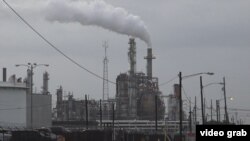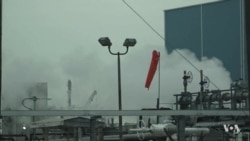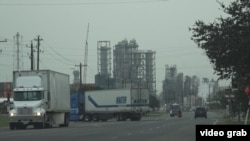The east side of Houston is dotted with what look like skyscrapers from a distance, but are actually chemical plants, key parts of the Gulf Coast city's economy.
"Houston, here in Texas, is in many ways the center of the petrochemical industry universe in the United States, so [there are] a very large number of chemical facilities, oil refineries," said Dave Wulf, acting deputy assistant secretary for infrastructure protection at the U.S. Department of Homeland Security.
Watch: Chemical Industry, U.S. Call for Global Culture of Chemical Security
Houston was the site of the 2017 Chemical Sector Security Summit, a three-day event ending Friday. Co-sponsored by DHS and the Chemical Sector Coordinating Council, composed of chemical industry trade associations, the summit is an event for sharing best practices related to securing chemical sites.
"We see terrorists globally continuing to seek out and actually use chemicals of this sort. ... They are using these in improvised explosive devices, among other things. They are using them in dispersion devices for toxic inhalation," Wulf said.
He pointed to examples such as the terrorist attack at the Brussels airport and metro station in 2016 and the 2015 attack in Lyon, France, where a terrorist drove into a chemical plant and caused an explosion.
Staying a step ahead
"Our challenge is always [to] be one step ahead, understanding what technology is coming, what's here," and then "to mitigate any of those threats or risks," said Gary Scheibe, security manager at Shell Deer Park refinery in Deer Park, Texas.
Wulf said it is not just chemical plants that could be targets for terrorists.
"We are talking about fisheries, wineries, breweries, semiconductor fabrication sites, food-processing plants" and more, he said.
In 2007, the federal government established security regulations, known as the Chemical Facility Anti-Terrorism Standards, that apply to chemical plants, electricity generation stations, refineries and other high-risk facilities, and it works with such facilities to develop site security plans.
Security experts said building a global culture of chemical security is key to keeping chemicals out of the hands of bad actors.
"No state can afford to ignore chemical security. States who have done so often find that they regret that decision later," said Peter Newport, director of security with the International Chemical Trade Association.
Traditionally, much of the chemicals have been produced in developed regions such as the U.S. and Europe, but developing nations such as China and India are stepping up production, said Krzysztof Paturej, president of the board of the International Centre for Chemical Safety and Security in Warsaw. He said Iran is a country where more production is also expected.
Paturej said it makes good economic as well as security sense for chemical producers to focus on having high security standards.
"If you want to go global, you have to apply the best standards, and the best standards are in developed countries and especially [the] United States," said Paturej.
Regardless of the country, security experts said chemical facilities hold symbolic and economic significance, so they become high-value targets for terrorists.







